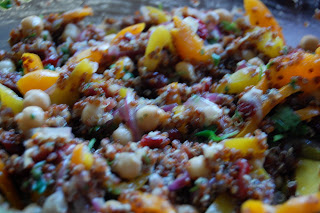Can We Think Ourselves Slim?
There is no doubt that the mind can affect the body.
You only need to think of something that you're afraid of and you release stress hormones from the pituitary gland in your brain that target the adrenal glands, resulting in adrenalin pumping through your body, and this increases blood volume to your major muscles. Just from a thought!
Similarly, a thought of something that embarrasses you will turn your face red.
But the question is -- can we harness this connection to make health-giving changes in our bodies?
There are a growing number of scientific studies that would say so. Take the "mental practice" study with stroke patients that was led by researchers at the Department of Physical Medicine and Rehabilitation of Cincinnati College of Medicine, for instance.
Thirty-two chronic stroke patients, who suffered a stroke between one and 14 years earlier, were involved. Half received twice-weekly physical therapy sessions over six weeks, which included a 30-minute relaxation session. The other half received the same physical therapy, but instead of relaxation they did a 30-minute session in "mental practice," where they had to imagine carrying out simple tasks like reaching for and grasping a cup or turning the pages of a book.
After the six weeks those in the mental practice group showed large reductions in arm impairment, which were significantly greater than those who did not do the mental practice. Through mental practice they were able to move better.
In many ways, moving and imagining moving is processed the same in the brain. But could this be applied to other things, like dieting perhaps?
To the brain, could imagining eating food be similar to actually eating food? And therefore, would your appetite for a food lessen the more you imagined eating it, just as it does when you actually eat?
A new scientific report seems to say so. Researchers at Carnegie Mellon University asked volunteers to imagine eating before they actually ate.
The study involved 51 people who were asked to imagine eating either three or 30 units of a particular food. The food in one of their experiments was M&Ms.
One set of volunteers had to imagine eating three M&Ms and they also had to imagine putting 30 coins into a laundry machine. Another set of volunteers had to do it the other way around. They imagined eating 30 M&Ms but were to imagine placing only three coins into the machine. A third set of volunteers just imagined placing 33 coins into the machine.
The reason for the coins in a machine was because the muscles used are similar to lifting food into your mouth.
After they did this, they were invited to eat some M&Ms from a bowl in preparation for what they were told was going to be a "taste test." Actually, it was really so that the experimenters could secretly record how many M&Ms they ate.
Incredibly, they found that those who imagined eating the most M&Ms ate much less from the bowl than those who imagined eating least or none at all.
The conclusion of the study was that imagining eating a particular food suppresses our appetite to eat more of it. The more we imagine eating, the less we want to eat.
What does this mean for many people who try to lose weight by reducing their intake of certain foods?
Typically, dieters try to suppress thoughts of certain foods. But as counterintuitive as it might sound, the best strategy might actually be to imagine really eating the food.
Thinking about, say, the smells of our favorite foods cooking can increase our appetite for the food and even cause us to salivate. This is why people try to suppress thoughts of foods when they are dieting. But imagining actually eating it is something else entirely.
The researchers found that if a person imagined the process of eating -- i.e., repetitively chewing and swallowing the food -- then it would produce a similar effect to actually eating the food. That is, less desire to eat more.
This is known as habituation. It is where a person's desire to eat an 11th square of chocolate is less than their desire to eat the first square. As we eat more, there comes a point when our appetite reduces. Otherwise we'd keep on eating. But the same thing happens when we just imagine eating. Our appetite also reduces.
Indeed, in discussing the research, Carey Morewedge, an assistant professor at Carnegie Mellon University who led the study said, "The difference between imagining and experiencing may be smaller than previously assumed."
This research certainly opens up new vistas for weight control if a person overeats a particular food that might be unhealthy for them.
The study didn't go as far to actually do this and we should be cautious about trying it too much, at least without speaking first to a physician, because we have as yet no idea what imagined eating does to, say, blood sugar levels.
But it's certainly something to think about...or imagine.
David R Hamilton Ph.D.
http://www.drdavidhamilton.com
-
Why Plant Based Diets Are Great For Weight Loss
Looking to shed real wei
-
How To Stay On Your Diet And Stay In Shape Over The Holidays
My mom makes the most amazing Christmas cake in the world; its been a
-
Problems Brought About By Weight Issues
The problem of obesity and overweight ma
-
Celebrate Failure!
Are you afraid to commit to yourself fully? Are you terrified to lo
-
Close Kept Secrets To Weight Loss Lesson 15
The simple aspect of breathing is the most incredible experience. Eac
-
My Body Is a Wonderland
Exhausted one morning after an 8-hour sl
- DON'T MISS
- Assistance In Weight Training Anyone Can Use
- The best way to Stop Obesity?
- Why The Scale Is A Bad Indicator Of Dieting Success
- Bariatric Treatment Center in Los Angeles
- Great Tips To Lose Weight And Keep It Off
- Most Effective Fat burning foods
- Learn The Secrets The Weight Loss Industry Doesnt Want You To Know About Weight Loss Diets
- Aerobics Exercise For Quick Weight Loss
- Weight Loss Tips That Will Make You Feel Great
- Never Diet AGAIN!




